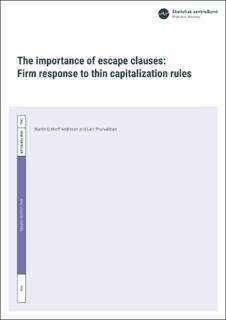| dc.contributor.author | Andresen, Martin Eckhoff | |
| dc.contributor.author | Thorvaldsen, Lars | |
| dc.date.accessioned | 2023-03-03T13:58:54Z | |
| dc.date.available | 2023-03-03T13:58:54Z | |
| dc.date.issued | 2023-02 | |
| dc.identifier.issn | 1892-753X | |
| dc.identifier.uri | https://hdl.handle.net/11250/3055790 | |
| dc.description.abstract | Escape clauses, where small firms are exempt from particular tax rules, is a crucial feature of a
number of corporate tax schemes, but creates incentives to avoid taxation by manipulating the
measures that determine inclusion. We evaluate the impact of thin capitalization rules, which
commonly feature such escape clauses, by exploiting the introduction of these rules in Norway
in 2014. Combining difference-indifferences, regression discontinuity and bunching estimates,
we show that what appears to be a strong response in the capital structure among exposed
firms primarily reflect within-group reallocation of debt to avoid exposure to the rules through
escape clauses. We observe sharp bunching among both new and existing subsidiaries at both
thresholds for rule inclusion, and find that internal corporate group debt is offloaded to these
bunching subsidiaries in order to avoid additional tax costs. As a result, significant and large
effects on firm-level capital structure in response to the thin capitalization rules is driven by
reshuffling of capital within corporate groups with little real effects. Re-estimating the
difference-indifference specification at the corporate group level confirms this finding,
questioning the extent to which thin capitalization rules have the intended effect due to the
presence of escape clauses. | en_US |
| dc.language.iso | eng | en_US |
| dc.publisher | Statistisk sentralbyrå | en_US |
| dc.relation.ispartofseries | Discussion Paper;No. 998 | |
| dc.rights | Attribution-NonCommercial-NoDerivatives 4.0 Internasjonal | * |
| dc.rights.uri | http://creativecommons.org/licenses/by-nc-nd/4.0/deed.no | * |
| dc.subject | Thin capitalization rules | en_US |
| dc.subject | Capital structure | en_US |
| dc.subject | Escape clauses | en_US |
| dc.subject | Difference-in-differences | en_US |
| dc.subject | Bunching | en_US |
| dc.title | The importance of escape clauses: Firm response to thin capitalization rules | en_US |
| dc.type | Working paper | en_US |
| dc.source.pagenumber | 43 | en_US |

